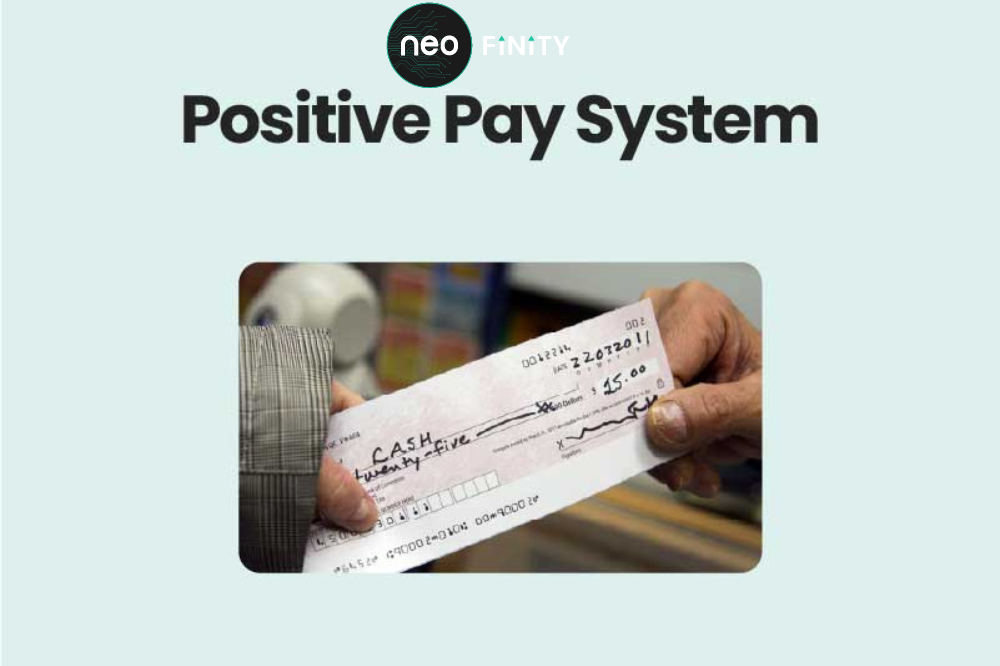Secured transactions are a priority for everyone, especially when they involve high-value cheques. Earlier when you went to the bank to deposit a cheque they would initiate the banking process. But now, when you offer a high-value cheque the banks would first ask you to share the details of the cheque and then process it. This extra authentication process is known as Positive Pay System (PPS). With the number of counterfeit cheques increasing in India, PPS is an innovative solution that may help banks verify the cheques and allow people to make safe transactions.
To minimize fraudulent financial activities, our Neofinity fintech solutions also ensure seamless payments and transactions. Backed by RBI, our payment and fintech products feature intelligence that guarantees secure payments in seconds or minutes.
We will offer you a guide to PPS for cheques, its limit, details and its mechanism.
What is a Positive Pay System (PPS)?
What is positive pay system? It is a financial solution that would allow customers or businesses to make payments safely. PPS full form is a positive pay system.
RBI has introduced this financial solution to increase the security of the cheques, especially if it is a high-value one. With a positive pay system, the one who draws the cheque authenticates important cheque details like cheque number, amount, and date. When you present the cheque for a transaction, the bank verifies the cheque again, before initiating the payment process. If the bank finds any discrepancy in the cheque such as any mismatch of details or unauthorized cheques, the bank would send authentication alerts to the person before processing the payment. This initiative ensures eliminating the risk of fraudulent activities and maintaining the integrity of the payment methods.
Positive Pay System Limit
While some banks don’t have any provisions for a positive pay system, there are banks like Punjab National Bank, HDFC, ICICI Bank, and Bank of Baroda that make PPS mandatory for cheques of INR 50,000 and beyond.
Positive Pay System is implemented when you have a cheque of and above Rs. 50,000. However, if you have cheques with low value, it won’t need the extra level of authentication.
Positive Pay Details
When you draw a high-value cheque, the bank may ask you to share the details of the cheque to initiate the PPS process. The details that you need to provide for verifying the cheque are:
- Customer’s account number
- Cheque number
- Name of the payee or beneficiary
- Cheque date
- Cheque amount
How Does a Positive Pay System Work?
A positive pay system ensures the safety and authenticity of high-value cheques so that transactions are hassle-free and that banks retain their integrity, amidst the light of counterfeit cheques. Here’s how the system works:
- Suppose, you are the issuer of the cheque, you have to provide essential details like the customer’s account number, the name of the beneficiary, the cheque number, the amount on the cheque and the cheque date.
- The issuer can share these details with the bank through email, mobile or internet banking or by visiting the bank branch.
- For smooth payment processing, the issuer sends these details a day before the beneficiary presents the cheque.
- The bank then confirms the details with the given cheque and if they find it accurate, they process the payment.
Conclusion
With increasing fraud transactions in India, RBI’s initiative with positive pay systems can be a definite shot for the banks. There have been a number of incidents with counterfeit cheques and to minimise such malpractices, a high authentication system of PPS has been implemented. Through this system, the issuer can share details of their cheque with the bank and before the beneficiary presents it, the bank will verify the details, where the beneficiary holds an account.
To make your transactions simpler and more secure, we are also offering premier Neofinity products. These products gives a way to innovative payments so that you don’t have to wait in long queues to make transactions from banks.
Faq’s On Positive Pay System
1. What is the process of PPS cheque?
The process of PPS allows issuer of a cheque to share details with the bank which includes cheque number, account number, cheque date, name of the payee and more. The bank then verifies the details once the payee presents the cheque and if it matches all the details, the bank sends the cheque for payment process.
2. Is PPS mandatory for a cheque of Rs 2 lakhs?
Yes, a cheque of Rs. 2 Lakhs is considered a high-value cheque and thus it will require PPS.
3. What is the limit of the account payee cheque?
The limit for account payee cheques is Rs. 50,000 and above.

Leave a Reply